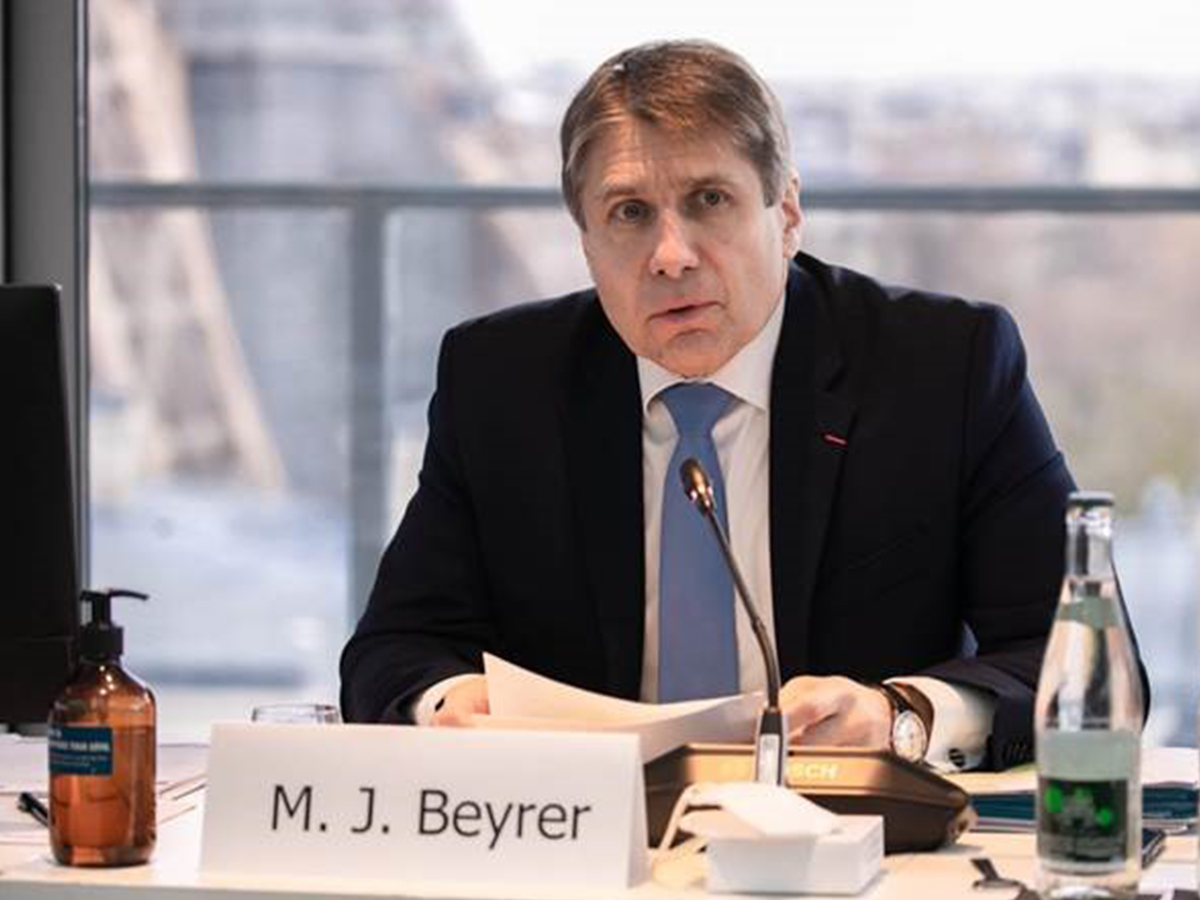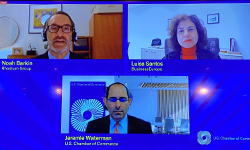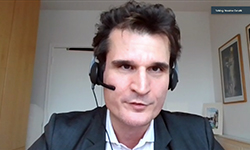BusinessEurope Headlines No. 2021-38
Exchange with Ambassador Dubreuil ahead of the French EU presidency

The French presidency of the Council of the EU will take office on 1 January. It will play an important role to bring forward discussions within the Council or trilogue meetings with the European Parliament. On the “Fit for 55” package, the European business community believes that ensuring a consistent approach calls for maintaining as much as possible the package together as a whole, keeping in mind the many interdependencies between the various proposals. On due diligence, we are open to a proposal, but the European Commission must make it workable for business and for the EU Member States. Pragmatism should prevail for the EU’s approach to due diligence to gather the necessary support. Concerning the Digital Services Act, we count on the French presidency to keep the country-of-origin principle and the agreed enforcement architecture in the upcoming trilogue with the European Parliament. On social issues, the French presidency should also defend the Council’s difficult compromises with the European Parliament in trilogues on minimum wages and on pay transparency. We also look forward to cooperating with the French presidency to markedly improve the Commission’s recent proposal for a directive on platform work. These were the key messages passed by BusinessEurope Director General Markus J. Beyrer, Deputy Director General Alexandre Affre and Director for Social Affairs Maxime Cerutti in a meeting with Fabrice Dubreuil, Deputy Head of the French Permanent Representation to the EU, which was held on 10 December 2021.
Contact: Asdin El Habbassi
Our comment
Economic policy makers need to think long-term in 2022
By James Watson, BusinessEurope Director of Economics
 There's an old saying that forecasting is difficult because it involves the future. But whilst the pandemic has made efforts to predict future economic performance even more challenging, the economic policy question we'll face in 2022 appears at least a little clearer.
There's an old saying that forecasting is difficult because it involves the future. But whilst the pandemic has made efforts to predict future economic performance even more challenging, the economic policy question we'll face in 2022 appears at least a little clearer.
The emergence of the Omicron variant and the possibility of increased transmission and some loss of vaccine effectiveness seems like an early Christmas present we could have all done without. With each wave of the virus to date, we have seen a declining negative impact on economic output as companies have learnt to adapt to restrictions. Whilst we can hope this trend continues, the new variant is also a reminder that the virus may not go away soon, and that we need to think about our response to the virus in at least a medium term-timeframe. Lockdowns may have been an essential response to save lives when we were awaiting the approval and distribution of vaccines, but with more transmissible variants reducing the likelihood of achieving anything approaching herd immunity through voluntary vaccinations alone, it will be increasingly important in 2022 that governments, following almost weekly changes to restrictions in some Members States recently, set out how the combination of restrictions and vaccinations provide a coherent strategy to allow us to live with the evolving virus.
Member States should also start setting out coherent long-term public finance strategies in 2022. On the positive side, we are already seeing Member States devote an increasing share of public finance to investment, in part to help address the challenges of the green and digital transitions. But the suspension of the Stability and Growth Pact (SGP) has allowed some Member States to temporarily avoid the difficult questions around how both current and past expenditure will be financed, with 10 Member States still expected to have government spending deficits greater than 3% in 2023. With the SGP expected to be back in force for 2023, progress is urgently needed to forge a consensus on a revised economic governance framework, although with widely different reform ambitious amongst Member States it will not be easy. As well as incentivising public investment, it is to be hoped that the revised framework helps ensure that any additional taxes are broad based and seek to avoid damaging investment and employment.
The consensus we have seen around EU monetary policy is also likely to come under increasing strain in 2022. An expansionary monetary policy can clearly only be compatible with the European Central Bank's (ECB) 2% target if the present headline rate of 4.1% can genuinely be considered to be temporary. Although most forecasters, including the ECB, have in recent months, extended the period during which they expect inflation to be above target, there remain reasons to be hopeful that once previous energy price rises drop out of the index, and global supply chain blockages start to ease, inflation will quickly fall. But as the ECB has also emphasised, the risk is that high rates of present inflation are translated into wage agreements, leading to a wage-price spiral. Wage moderation will be essential, recognising, as ECB Executive Board Member Fabio Panetta has argued, that recent (imported) energy price rises are equivalent to a terms of trade “tax” which, (unfortunately) compress real disposable income.
The expectation that present high inflation rates can prove temporary also appear to assume that structural economic changes that might negatively impact inflation dynamics haven't taken place during the pandemic. If the pandemic subsides, and the global economy shifts to a more stable “new normal”, we will hopefully learn more about such longer-term changes in 2022. In particular, within the labour market, we are already seeing unusually high job vacancy rates and hiring difficulties for this point in the economic cycle, likely to be at least in part the result of accelerated structural shifts over the last two years, in particular towards greater digitalisation. Whilst there appears less evidence within the EU of what is being termed in the USA, “the great resignation”, it cannot be ruled out that a combination of forced savings, and a re-evaluation of life goals as a result of the pandemic, may prompt, particularly older workers, to be less likely to seek employment, adding to long-term labour market tightness.
This reminds us that decisions taken by governments during this pandemic can continue to have profound impacts on the long-term competitiveness. EU Member States must make the best use possible of the once in a generation opportunity provided by the next Generation EU funds to transform competitiveness through investment and reforms. But such efforts will be in vain if we allow the pandemic to irreparably damage the education and life chances of a generation of young people. So my personal Christmas wish is that if difficult decisions need to be taken in the coming months, governments have a renewed commitment to making the continuation of education a key priority.
Contact: James Watson
Priorities for EU-USA cooperation on non-market economies
 “European and US companies are equally impacted by market distortions generated by non-market economies. Therefore we have an interest in working together to promote competitive neutrality principles and restore market conditions”, said Luisa Santos, Deputy Director General of BusinessEurope during a panel discussion on 9 December at the Transatlantic Business Works Summit, organised by the US Chamber of Commerce. She pointed out that transatlantic cooperation in this area should focus on: (1) setting disciplines on distortive subsidies, the role of State Owned Enterprises and forced technology transfers in the context of the trilateral discussions that also include Japan; (2) ensuring that unilateral actions like export controls or sanctions are better coordinated and don’t have unwanted impacts on each-others’ companies; (c) exchanging best practices in implementing different policy tools that aim at restoring market conditions; and (d) working together in the WTO reform process, including the dispute settlement procedure.
“European and US companies are equally impacted by market distortions generated by non-market economies. Therefore we have an interest in working together to promote competitive neutrality principles and restore market conditions”, said Luisa Santos, Deputy Director General of BusinessEurope during a panel discussion on 9 December at the Transatlantic Business Works Summit, organised by the US Chamber of Commerce. She pointed out that transatlantic cooperation in this area should focus on: (1) setting disciplines on distortive subsidies, the role of State Owned Enterprises and forced technology transfers in the context of the trilateral discussions that also include Japan; (2) ensuring that unilateral actions like export controls or sanctions are better coordinated and don’t have unwanted impacts on each-others’ companies; (c) exchanging best practices in implementing different policy tools that aim at restoring market conditions; and (d) working together in the WTO reform process, including the dispute settlement procedure.
Contact: Luisa Santos
How to pursue a positive agenda with China on climate policy
 On 10 December BusinessEurope organised a webinar on how to cooperate with China on climate issues as part of the series of webinars “How to Pursue a Positive Agenda with China?”. Speakers included Jacob Werksman, Principal Adviser for International Aspects of EU Climate Policy, DG CLIMA, European Commission, and Huw Slater, Chair of the Carbon Market Sub-Working Group of the European Chamber of Commerce in China. They discussed the main outcomes of COP26, in particular regarding China’s commitments and next steps, as well as how to engage and continue climate discussions with China, e.g. on CBAM, global carbon price and green technology. The Chinese perspective, including China’s climate policies and how to engage with China, notably from the perspective of European companies based in China, were also part of the discussion. It was highlighted that China is an important partner in tackling climate change. This is one of the key areas where the EU can pursue a positive agenda with China at a time when the EU-China relations navigate through choppy waters.
On 10 December BusinessEurope organised a webinar on how to cooperate with China on climate issues as part of the series of webinars “How to Pursue a Positive Agenda with China?”. Speakers included Jacob Werksman, Principal Adviser for International Aspects of EU Climate Policy, DG CLIMA, European Commission, and Huw Slater, Chair of the Carbon Market Sub-Working Group of the European Chamber of Commerce in China. They discussed the main outcomes of COP26, in particular regarding China’s commitments and next steps, as well as how to engage and continue climate discussions with China, e.g. on CBAM, global carbon price and green technology. The Chinese perspective, including China’s climate policies and how to engage with China, notably from the perspective of European companies based in China, were also part of the discussion. It was highlighted that China is an important partner in tackling climate change. This is one of the key areas where the EU can pursue a positive agenda with China at a time when the EU-China relations navigate through choppy waters.
Contacts: Elena Suárez and Benedikt Wiedenhofer
Euro-Mediterranean employment and social policy cooperation: Women and youth employability in focus
 The Ministers of Labour of the Union for the Mediterranean (UfM) countries and social partners from both shores of the Mediterranean met on 14 December in Barcelona to prepare the 5th UFM Ministerial Policy Conference “Employment and employability of the most vulnerable, especially youth and women”. The conference is planned for mid-May 2022 in Morocco and shall lead to signing the Ministerial Declaration that will become roadmap for activities between 2022 and 2025. The European Training Foundation (ETF) presented its work on the monitoring exercise that allows to assess the progress in implementing the 2019 Cascais Ministerial Declaration by volunteering UfM members. The cross-country report is planned for publication in February 2022.
The Ministers of Labour of the Union for the Mediterranean (UfM) countries and social partners from both shores of the Mediterranean met on 14 December in Barcelona to prepare the 5th UFM Ministerial Policy Conference “Employment and employability of the most vulnerable, especially youth and women”. The conference is planned for mid-May 2022 in Morocco and shall lead to signing the Ministerial Declaration that will become roadmap for activities between 2022 and 2025. The European Training Foundation (ETF) presented its work on the monitoring exercise that allows to assess the progress in implementing the 2019 Cascais Ministerial Declaration by volunteering UfM members. The cross-country report is planned for publication in February 2022.
BusinessEurope welcomes the UfM Regional Platform on Employment and Labour focus on supporting women and youth employment as well as the importance attached to the digital and green transitions that are powerful game changers. Involving social partners is necessary to ensure that the twin transition is inclusive and results in job creation. We also believe that economic growth is the underlying condition for job creation, while timely and meaningful social dialogue is important to secure a good adaptation of enterprises and workers to changing labour market realities. Social partners are also crucial in anticipating changing skills needs on the regional and local labour markets, as well as across sectors. They are also instrumental in navigating effective job-to-job transitions between companies and sectors, if necessary.
Photo copyright: Union for the Mediterranean
Contact: Anna Kwiatkiewicz-Mory
EU agreement on active ageing and inter-generation approach: taking stock of national implementation
 Positively, the 2017 social partner agreement on active ageing has contributed to a wealth of social partners negotiations and activities at national level in the last four years. This includes the cooperation with national governments on a tripartite level to mobilise the necessary resources. Whereas the employment rate of older workers (55-64 age cohort) has increased in the last decade, from 45,9% in 2011 to 59,1% in 2019 for the EU 27, social partners’ actions contributed to support older workers in the workforce. More generally, this agreement increased the understanding among social partners regarding the value of workers of all ages and the need to adopt a life-course approach to support employment participation in different life phases and effective transitions in-between. These were the key messages passed by Maxime Cerutti, BusinessEurope Social Affairs Director, at the European social partners final conference on implementing the autonomous framework agreement on active ageing and an inter-generational approach that was held on 15 December. This conference has been a good occasion to take stock with national social partners of various national approaches to implementing the agreement, building up mutual awareness and learning among social partners from different countries. The discussions also revealed the challenges encountered during the agreement’s implementation due to the Covid-19 pandemic, and the fact that its relevance only increases in the post-Covid recovery characterised by growing skills and labour force shortages.
Positively, the 2017 social partner agreement on active ageing has contributed to a wealth of social partners negotiations and activities at national level in the last four years. This includes the cooperation with national governments on a tripartite level to mobilise the necessary resources. Whereas the employment rate of older workers (55-64 age cohort) has increased in the last decade, from 45,9% in 2011 to 59,1% in 2019 for the EU 27, social partners’ actions contributed to support older workers in the workforce. More generally, this agreement increased the understanding among social partners regarding the value of workers of all ages and the need to adopt a life-course approach to support employment participation in different life phases and effective transitions in-between. These were the key messages passed by Maxime Cerutti, BusinessEurope Social Affairs Director, at the European social partners final conference on implementing the autonomous framework agreement on active ageing and an inter-generational approach that was held on 15 December. This conference has been a good occasion to take stock with national social partners of various national approaches to implementing the agreement, building up mutual awareness and learning among social partners from different countries. The discussions also revealed the challenges encountered during the agreement’s implementation due to the Covid-19 pandemic, and the fact that its relevance only increases in the post-Covid recovery characterised by growing skills and labour force shortages.
![]() Contact: Anna Kwiatkiewicz-Mory
Contact: Anna Kwiatkiewicz-Mory
Discussing VAT priorities with the French EU presidency
 In light of the upcoming French presidency of the Council of the EU, BusinessEurope’s VAT Policy Group welcomed Ines Montouillet and Colin Beziade (French Ministry of Economy and Finance) to its meeting on 15 December. Following a discussion on the priorities for the French presidency of the Council in the area of VAT, the group highlighted in particular the several VAT measures that tax authorities took during the outbreak of the Covid-19 pandemic to support the economy, and hoped that the recognition of the importance of VAT to businesses’ liquidity could continue after the Covid-19 crisis. The representatives of the French presidency and the group also exchanged views on the upcoming initiative by the European Commission on "VAT in the Digital Age", and the group expressed its support for the continued fight against VAT fraud and the further extension of the VAT One Stop Shop.
In light of the upcoming French presidency of the Council of the EU, BusinessEurope’s VAT Policy Group welcomed Ines Montouillet and Colin Beziade (French Ministry of Economy and Finance) to its meeting on 15 December. Following a discussion on the priorities for the French presidency of the Council in the area of VAT, the group highlighted in particular the several VAT measures that tax authorities took during the outbreak of the Covid-19 pandemic to support the economy, and hoped that the recognition of the importance of VAT to businesses’ liquidity could continue after the Covid-19 crisis. The representatives of the French presidency and the group also exchanged views on the upcoming initiative by the European Commission on "VAT in the Digital Age", and the group expressed its support for the continued fight against VAT fraud and the further extension of the VAT One Stop Shop.
Contact: Pieter Baert
Happy holidays!
 BusinessEurope wishes you a festive season full of serenity and hope for a happy and healthy year 2022.
BusinessEurope wishes you a festive season full of serenity and hope for a happy and healthy year 2022.
Calendar 
- 11 January: How can stronger IP in EU free-trade agreements boost productivity and economic growth in Europe?
- 8 - 12 February: EU Industry Days
- 28 February: Monitoring and evaluation in lifelong guidance – towards future European standards?
Not yet a subscriber? Register here.
Reminder: please have a look at our privacy policy